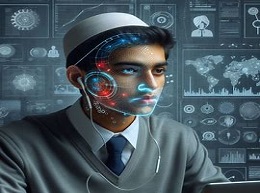AI in Anthropology: Analyzing Human Societies and Cultures

The Intersection of AI and Anthropology
The field of anthropology, which seeks to understand human societies and cultures, is undergoing a transformative shift with the integration of artificial intelligence (AI) technologies. AI tools and techniques are empowering anthropologists to analyze vast amounts of data, uncover hidden patterns, and gain deeper insights into the complexities of human behavior and cultural practices. In this article, we delve into the diverse ways in which AI is being applied in anthropology, from studying ancient civilizations to understanding contemporary social dynamics.
Digital Anthropology: Analyzing Online Communities
One area where AI is making significant contributions to anthropology is in the study of online communities and digital cultures. With the proliferation of social media platforms, forums, and virtual worlds, anthropologists are leveraging AI-powered data mining and natural language processing techniques to analyze digital traces left by individuals and groups. By studying online interactions, language use, and cultural artifacts, researchers can gain valuable insights into the dynamics of virtual communities and the ways in which digital technologies shape human behavior and identity.
Cultural Heritage Preservation
AI is also playing a crucial role in the preservation and analysis of cultural heritage. Machine learning algorithms are being used to digitize and classify archaeological artifacts, decipher ancient texts and languages, and reconstruct historical sites and monuments. For example, AI-powered image recognition algorithms can analyze satellite imagery to identify potential archaeological sites or monitor changes in cultural landscapes over time. By combining AI with traditional archaeological methods, researchers can preserve and document cultural heritage for future generations.
Language and Linguistic Analysis
Language is a fundamental aspect of human culture, and AI technologies are revolutionizing the study of linguistic diversity and evolution. Natural language processing (NLP) algorithms can analyze large corpora of texts in different languages, identify linguistic patterns, and track changes in vocabulary and syntax over time. AI-driven language models can also assist anthropologists in translating and transcribing texts, facilitating cross-cultural communication and collaboration.
Ethical Considerations and Challenges
While AI offers exciting opportunities for anthropological research, it also raises important ethical considerations and challenges. There are concerns about data privacy, consent, and the potential for algorithmic bias in AI-driven research. Additionally, anthropologists must grapple with questions of cultural sensitivity and representation when applying AI techniques to study diverse human societies. It is essential for researchers to approach AI-powered anthropology with a critical and reflexive lens, ensuring that their methods and findings uphold ethical standards and respect the rights and dignity of the communities they study.
The Future of AI in Anthropology
In conclusion, AI is revolutionizing the field of anthropology by enabling researchers to analyze human societies and cultures in new and innovative ways. From studying online communities to preserving cultural heritage and analyzing linguistic diversity, AI-powered tools and techniques are expanding the frontiers of anthropological inquiry. As technology continues to advance, the integration of AI in anthropology holds immense promise for gaining deeper insights into the human condition and addressing pressing social and cultural challenges. By embracing AI-driven approaches, anthropologists can navigate the complexities of human diversity with greater precision and empathy, ultimately enriching our understanding of the world we inhabit.